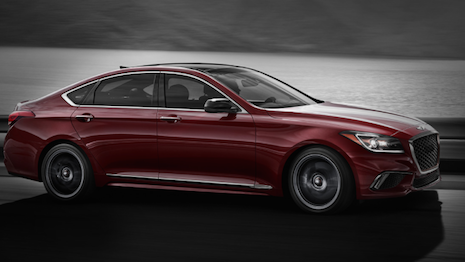- About
- Subscribe Now
- New York,
December 4, 2017

 The Genesis G90 was the top luxury vehicle of the year. Image credit: Genesis
The Genesis G90 was the top luxury vehicle of the year. Image credit: Genesis
In a survey of the most-loved auto brands in the United States, BMW placed as number one overall, but Tesla's Model X was respondent's favorite model, signifying electric vehicles' rising status in the world luxury automotive.
This data comes from Strategic Vision, which surveyed more than 34,000 customers on which luxury auto brands they love the most and which are underperforming in their eyes. The results show that electric cars and hybrids are steadily gaining popularity among affluent car-buyers, with Tesla leading the charge.
Electric cars
In the world of luxury cars, there is not traditionally much room for new upstart brands to make much headway.
The costs of starting a car brand are prohibitive and as a consequence, there are far fewer new car manufacturers than there are new perfume brands, for example.
But a new study by Strategic Vision shows two surprising new brands making waves in the luxury car world.
Tesla's Roadster is a luxury electric car. Image credit: Tesla
For one, Tesla’s Model X has emerged as the most loved model of car while emerging luxury brand Genesis came in as the second most loved luxury brand behind BMW.
The Genesis G90 is the most loved luxury car of the year and the brand’s rising status represents a significant challenge to the established brands that compete with it.
As far as Tesla goes, its spot as the most loved car of the year overall shows that hybrids and electric cars are becoming increasingly popular among environmentally-conscious consumers for whom brand values and responsibility are an important part of their shopping habits.
Challenging the order
While Tesla may not have been categorized as a luxury car by this study, hence Genesis winning the most loved luxury car category, there is no denying that Teslas are being targeted for affluent customers.
Tesla already entered the supercar category with the launch of its Roadster.
With a base price of $200,000, the Roadster is going head-to-head with other six-figure sports cars, such as those produced by Ferrari and Lamborghini. While Tesla's Model 3 spoke to an aspirational audience, this latest release further cements Tesla's luxury positioning (see story).
The growing demand for electric cars is emblematic of the modern consumer's environmental consciousness, something that Tesla has actively encouraged.
Tesla is responding to luxury automotive's growth in China by signing a preliminary agreement for an endeavor that will dramatically reduce cost in terms of product sales in the region.
Tesla's Model X was the overall most popular car of the year in Strategic Vision's story. Image credit: Tesla
The Wall Street Journal has reported that Tesla signed a preliminary agreement with the government of Shanghai to build a factory. Luxury automakers have been bullish on the Chinese market with the demand steadily growing (see story).
Across the auto industry, electric cars have been making a splash.
Automaker Jaguar’s announcement that all future models will have an electric option reveals the vital importance of sustainable energy in the auto industry.
Jaguar Land Rover has announced that every one of its models starting in 2020 will be available to be electric-powered, following similar news from BMW and Volvo. As Volvo is a mass production brand, BMW a luxury and Jaguar a sport, the auto industry is no doubt headed for a future heavily integrated with sustainability (see story).
This investment is paying off as Strategic Vision’s survey shows that luxury consumers are embracing electric cars and will continue to do so in the future.
Share your thoughts. Click here